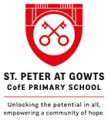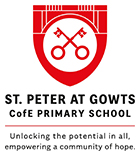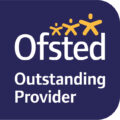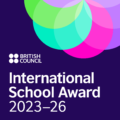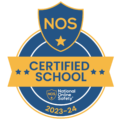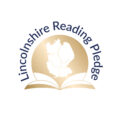Religious Education
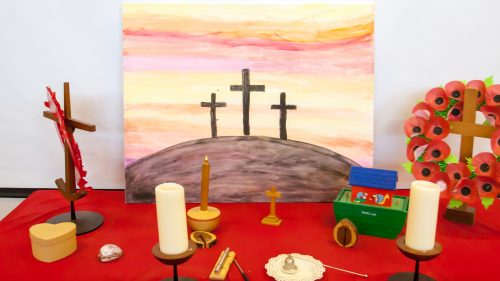 RE intent statement:
RE intent statement:
At St Peter at Gowts, our Religious Education (RE) curriculum is inspiring and creative, unlocking potential in all. Our curriculum seeks to ensure that all pupils flourish through challenge, support and a broad and balanced curriculum, rooted in shared values and consistently high expectations, while striving for excellence.
St Peter’s RE curriculum is fashioned through our golden threads of values, inspiration, excellence and community.
Through the RE teaching and learning at St Peter’s, we aim for all learners to be religiously literate and able to hold balanced, informed and respectful conversation about religion and belief. Through our ambitious and cohesively planned curriculum, we aim to inspire the children of St Peter’s to understand the religious diversity of our local area. We are enthusiastic about cultivating a strong and inclusive community that works together and supports people in times of need. We provide opportunities for all children to ask and create intriguing questions that challenge aspects of religion and their own understanding and concepts. We challenge racism and all forms of prejudice and we see RE as one curriculum area in which our children encounter and critically reflect on a range of world views. At St Peter’s, we expertly teach the children the knowledge and skills to do this.
Values – The golden thread of values, our school and British Values, is of great importance in the RE curriculum and the children’s understanding of values impacts greatly on how the children articulate their understanding of and opinions on religious and secular worldviews. We have created a values-based culture where the children are capable of showing mutal respect, tolerance and empathy towards each other and above all show respect to all opinions and views.
Inspirational – Our inspiring RE curriculum is built upon enrichment opportunities which provide opportunities for our children that they would otherwise not experience. Opportunities such as visits to Lincoln Cathedral and the Mosque in our local area plus visitors including Humanists and debates with practising Christians about beliefs around Christianity and science. Our curriculum also encourages the children to debate key aspects within the religions/worldwide views that we study and provides the children with the knowledge to form their own well-reasoned opinions and views.
Community – Creating a community of hope is of high importance in the RE curriculum. The teaching and learning within the RE curriculum aims to develop the knowledge and understanding for all, both children and their families to try to empower a community of hope and allow families to live in informed harmony within the local community.
Excellence – Our cohesively planned RE curriculum fully embraces the aim of the Lincolnshire Agreed Syllabus, educating children who are religiously literate and able to hold balanced and informed conversations about religion and belief. Our creative teaching allows children to articulate their thoughts and opinions in a variety of ways to ensure every child has the opportunity to achieve.
RE implementation:
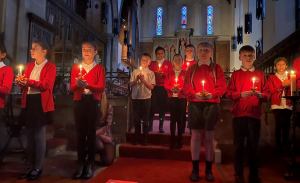
Our RE curriculum is built around the Lincolnshire Locally Agreed Syllabus and Understanding Christianity resources. All learning is enhanced and personalised to meet the needs of all learners at St Peter’s. Enhancements and personalisation include the use of adaptive teaching, links to the community and our locality and purposeful cross curricular links, which are planned and timely to support and strengthen learning. Our St Peter’s EYFS Curriculum relates to the objectives as set out in the Early Learning Goals, with clear progression from our littlest of learners (aged 2) to our end of Reception children.
- RE topics begin with a pre-assessment of current knowledge and skills, from which a learning sequence is developed alongside the LAS.
- Our spiral curriculum is progressive in skills and knowledge with key vocabulary underpinning topics, which is subsequently built upon through topics and year groups.
- Key areas of learning are revisited regularly and links are made within and between topics which supports our children’s learning through spaced repetition and learning flashbacks. This formative assessment is used to inform future lessons in the learning sequence to help children to gather a broad and deep understanding of the topic.
- Assessment of skills and knowledge happens on a lesson-by-lesson basis and this information is used to inform future lessons and identify ‘high flyers’ in particular strands of RE, and any children that may require additional support.
- Progress pauses are planned for mid-way through a topic, where the ‘big question’ will be initially answered with children’s current knowledge and understanding. This will indicate the progress that children are making and how secure their understanding is developing. This information will be used to identify whether any areas already taught need additional coverage either through added teaching or use of flashbacks to secure knowledge.
- All learners are supported through appropriate support and stretch challenges based on assessment for learning, to ensure the needs of all learners are met.
- Enrichment opportunities are used to help support the learning of key aspects and provide first hand experiences, for example visits to the local church, Lincoln Cathedral and mosque.
- Classroom working walls reflect the learning journey of the class, highlighting key knowledge and specific vocabulary. Working walls may also identify links between previously learnt topics to help make connections between key themes and aid retention.
- At the end of a topic, pre-assessments are revisited for children to reflect upon and show off their new learning. The ‘big question’ will be answered once more showing the impact of children’s learning. Learning flashbacks throughout the rest of the year will allow children to revisit their learning, ensuring it remains in the long-term memory ready for further connections to be made.
- Local and wider career opportunities are celebrated and explored throughout school.
RE impact:
The children of St Peter’s will transition to secondary school with an excellent knowledge of the religious and secular worldviews covered by the RE curriculum. They will be confident within themselves to ask high-level questions that will challenge their own and others understanding of different religions and secular worldwide views. By having a strong foundation of values and RE knowledge, the children of St Peter’s will be respectful and tolerant towards those with varied diverse religious beliefs, educating and empowering our community of hope.
